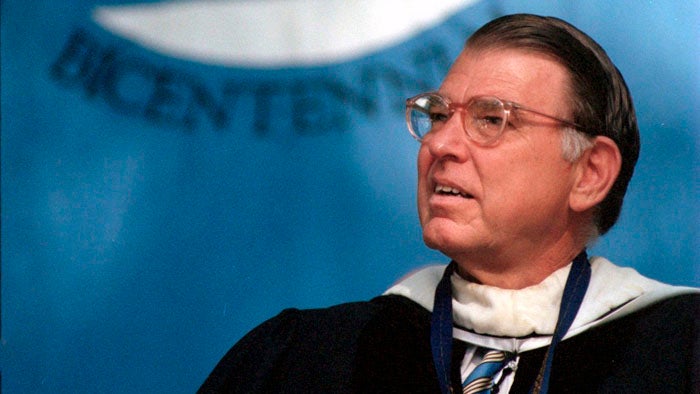Former UNC System President C.D. Spangler Jr. dies at 86
Published 11:34 pm Monday, July 23, 2018

- In this Oct. 12, 1993, photo, UNC system President C.D. Spangler Jr. appears at the kick off ceremony for the UNC-CH campus bicentennial in Chapel Hill. Billionaire philanthropist Spangler, who led North Carolina's university system for more than a decade, has died. He was 86. Spangler died Sunday, according to the University of North Carolina System. The News & Observer via AP
By Emery P. Dalesio and Jonathan Drew
Associated Press
RALEIGH — Billionaire philanthropist C.D. Spangler Jr., who led North Carolina’s university system for more than a decade, has died. He was 86.
Spangler died Sunday, according to the University of North Carolina System.
Spangler became president of the system in 1986 and led it for 11 years, working to keep tuition low and championing its role as an economic driver for the state.
The current president of the 17-campus system, Margaret Spellings, said Spangler, also known as “Dick,” helped to “change lives and transform a state.”
“The first in his family to go to college, Dick never forgot who our public universities were meant to serve,” she said in a statement. “North Carolina is the prosperous, growing state that it is because of principled leaders like Dick.”
One of the wealthiest men in North Carolina, Spangler amassed a fortune estimated at about $4 billion through family companies and his leadership of National Gypsum, according to Forbes magazine. He served as chairman of the company that makes wallboard and other building products after leading investors who bought it in the 1990s.
In an interview at the end of his tenure as system president, the Charlotte native said low tuition helped him to attend the University of North Carolina from 1950 to 1954. He also attended Harvard Business School. Spangler was a generous contributor to both universities.
“Low tuition is not a gift,” Spangler told The Associated Press in 1997. “It’s an investment in these students. They go to work and pay that back over a lifetime.”
Spangler also was mindful that the state Constitution demanded that university tuition stay as low as possible, said Molly Broad, who succeeded him as UNC president before heading the American Council on Education.
“His commitment to that provision was very strong,” Broad said in an interview. “He was determined that the cost of higher education would be managed.”
UNC said Spangler also implemented minimum admissions requirements and athletic reforms. He helped increase the system’s budget and external funding for research.
Spangler’s work as university president was unpaid. He didn’t need the money. He built his wealth in the family construction business, by selling a smaller bank to the precursor of what would become Bank of America, and later buying National Gypsum after bankruptcy and building it into the country’s second-largest wallboard producer, said Hugh McColl, Bank of America’s first CEO.
“He always had a brilliant mind in terms of evaluation opportunity and seizing it, and he did it many times over,” McColl said in an interview.
Stock in Charlotte-based Bank of America provided the bulk of the more than $300 million channeled into a family foundation that supports cultural and education groups, according to the foundation’s most recent report to the Internal Revenue Service.
Spangler’s daughter, Anna Spangler Nelson, is a current member of the state public university governing board.
Away from UNC, Spangler showed his commitment to public education by sending his children to public high school, said Anthony Foxx, a former Charlotte mayor and U.S. transportation secretary.
“He understood our society well and took responsibility for making it better,” Foxx said on Twitter. “He did so humbly — at least as humbly as any billionaire could do anything.”
Spangler loved classical music and art, “was tremendously well-read, thoroughly educated and a lot of fun to be around,” McColl said of the man he met for lunch every few weeks for two decades. “Not only was he a great businessman, he was really a Renaissance man.”




